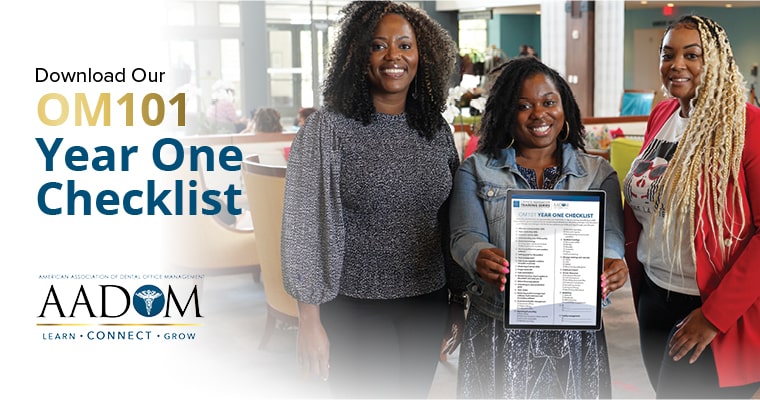6 Strategies to Effectively Delegate [and Why It’s Important]

Within our roles as dental office managers, we’re responsible for performing multiple different tasks. We oversee patient accounts in regard to both treatment planning and presentation, as well as the ledger and reconciliation.
We’re also the ones responsible for ensuring that new patients are to be treated like royalty. Many of us might also handle the social media accounts and the content that’s shown on behalf of our practice.
All in a day’s work, we wear many hats.
Although we might feel we can handle the load, we must ask ourselves,
- Are we being effective in completing all these separate tasks?
- Are we focusing more on one role than the other, resulting in too much time being spent?
I feel it’s imperative to delegate when necessary.
Small tasks that can be given to other members of the team help free up our most valuable asset: time.
Why delegation is important
Delegation is a fine art. The art of entrusting responsibility to a team member with the hopes that they’ll follow through and complete the task both in an effective and timely manner.
Without delegation in place, it’s difficult to measure our own shortcomings or room for growth with all of the responsibilities we carry.
Together as a team and with the right delegation, any goal can be achieved. But it requires six essential steps.
Step 1. Define the goal
What is the desired outcome?
A solid goal must be set in place.
I would advise telling your staff why the task is being created, what makes it important, and how their involvement is required.
By explaining how prominent their role is, it will promote a sense of value and, thus, a higher level of commitment.
Step 2. Select the person(s) for the task
Who all needs to be included?
It’s important to be aware of what other responsibilities they carry, so as not to add too much of a workload and still retain a high commitment level.
Ask who can possibly learn a new skill?
I would suggest you look at what staff member(s) can cross-train to help grow and develop the skillset each person involved.
Step 3. Solicit the employee’s views about their potential tasks
It’s important that they fully understand what is being asked of them and what the expectations are. Then, allow them to ask questions or make suggestions.
Listen attentively to their ideas to check that they are insightful, on topic, and beneficial to the practice.
A clear, concise agreement and reiteration will be helpful to sum up what was discussed between all staff members.
This will ensure the entire team is on the same page.
Step 4. Give your staff member(s) the authority, time, and resources to perform the task
You are officially giving the authority or delegating the role to the staff member(s). Be sure to include a deadline for timely completion and minimized delays.
Deadlines are important in setting clear expectations.
Step 5. Schedule checkpoints to review progress
Effective delegation is not giving a task to someone and then waiting for the deadline to approach. It is imperative to perform follow-ups throughout the process.
Ask what can be done to ensure the project moves forward with minimal interruption.
It is still important to show the staff member(s) that you are involved and available. Depending on the length and timeline of the project, specific periodic huddles should be set up as needed.
Step 6. Follow through by discussing progress if needed
This can easily take place in morning huddles to ensure the team is staying on task.
Have a clear, concise discussion about what has been done, what is being worked on, and what still needs to be accomplished.
During these periodic huddles, I would suggest you stress the accountability of each team member. Keeping them focused and on task reiterates a sense of commitment and camaraderie.
Effective delegation will lead to nothing short of a favorable outcome
“It is essential to delegate, if you are not delegating, you are hardly getting things done. The more you delegate, the more you’re truly establishing and maintaining a practice.” – unknown
Meet the Author
 Claudia Paye, MAADOM is a practice administrator in St. Johns, FL.
Claudia Paye, MAADOM is a practice administrator in St. Johns, FL.
In 2016, she was awarded the Henry Schein Green Leader Award, and in 2017, she was named one of the Top 25 Women in Dentistry.
Claudia is also a recipient of the AADOM Office Manager of Distinction award. She is a former president of the New York, NY AADOM Chapter… This text opens a new tab to the NYC chapter’s website… and is now a proud board member of the Northeast Florida AADOM Chapter… This text opens a new tab to the NE FL chapter’s website….
For over twenty years, she has prided herself on amazing service to her patients and the surrounding communities.
In her free time, she enjoys traveling, hiking, running Disney marathons, and listening to country music. She is also a proud mother to four and a new grandmother.







